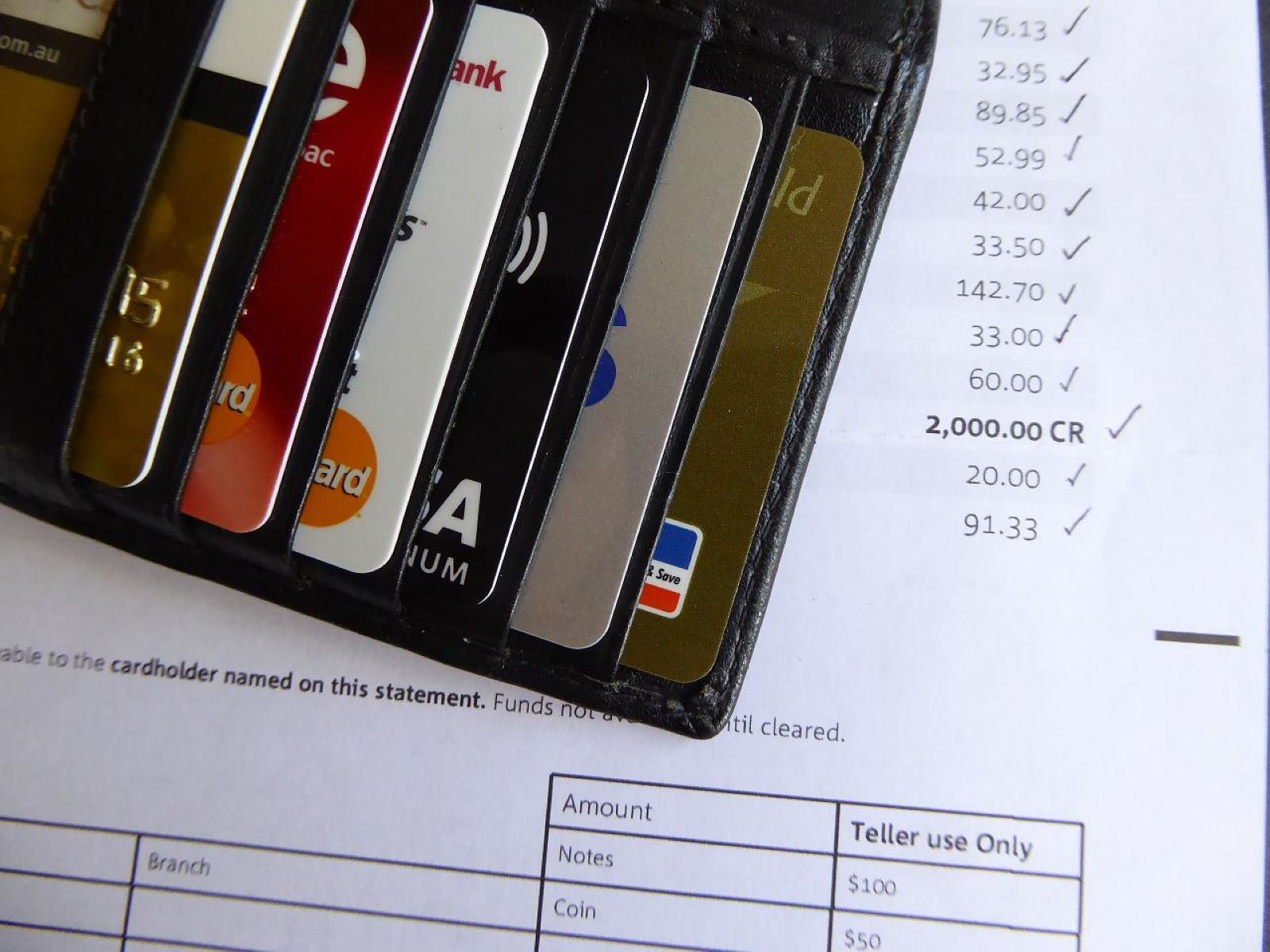

Finance
What Does Pre-Selected Mean For A Credit Card
Published: October 25, 2023
Discover what "pre-selected" means for a credit card and how it relates to finance. Gain insights into the financial implications of pre-selection in credit card offers.
(Many of the links in this article redirect to a specific reviewed product. Your purchase of these products through affiliate links helps to generate commission for LiveWell, at no extra cost. Learn more)
Table of Contents
- Introduction
- Understanding Pre-Selected Credit Cards
- How Are Pre-Selected Credit Cards Different?
- Benefits of Pre-Selected Credit Cards
- Potential Drawbacks of Pre-Selected Credit Cards
- How to Apply for a Pre-Selected Credit Card
- Factors to Consider Before Accepting a Pre-Selected Offer
- Building Credit with a Pre-Selected Credit Card
- Conclusion
Introduction
When it comes to choosing a credit card, the options can be overwhelming. With so many credit card companies vying for your attention, it’s not uncommon to receive offers in the mail that claim you’ve been pre-selected for a credit card. But what exactly does that mean? And should you take advantage of these pre-selected offers?
In simple terms, being pre-selected for a credit card means that the credit card issuer has done a preliminary screening of your credit profile and determined that you meet certain criteria for their credit card. This could be based on factors such as your credit score, income, and payment history. It’s important to note that being pre-selected is different from being approved. Pre-selection is more like an invitation to apply for the credit card, while approval is the final step where the issuer formally grants you the credit.
Many credit card companies use pre-selection as a way to target potential customers who are more likely to be approved for their credit cards. By narrowing down the pool of potential applicants, credit card companies can save time and resources by focusing only on individuals who are likely to meet their credit card criteria. This also means that when you receive a pre-selected offer, your chances of being approved for the credit card are higher compared to if you were to apply without any pre-selection.
Understanding pre-selected credit cards and their implications can help you make a more informed decision when it comes to choosing a credit card. In the following sections, we’ll delve into the details of pre-selected credit cards, their benefits, potential drawbacks, and what you should consider before accepting a pre-selected offer.
Understanding Pre-Selected Credit Cards
Pre-selected credit cards, also known as pre-approved credit cards, are offers that credit card companies extend to individuals who meet certain criteria. These criteria are typically based on factors such as credit score, income, and payment history. The credit card issuer analyzes your credit profile to determine if you are a suitable candidate for their credit card before sending you a pre-selected offer.
Receiving a pre-selected credit card offer does not guarantee approval. It simply indicates that based on a preliminary assessment of your creditworthiness, you have met the initial criteria set by the credit card company. You will still need to complete an application and undergo a formal review process before being approved for the credit card.
Pre-selected credit cards are often sent through mail or email, and they may come with attractive incentives such as a lower interest rate, a higher credit limit, or additional rewards. These offers are designed to entice potential cardholders and make the application process more appealing.
It’s important to understand that pre-selected credit card offers are not exclusive. The credit card company may send these offers to a large number of individuals who meet their initial criteria. However, the fact that you have been pre-selected does indicate that you have met certain creditworthiness requirements, which can increase your chances of being approved for the credit card.
If you receive a pre-selected offer, it’s essential to carefully review the terms and conditions before making a decision. Take the time to understand the interest rates, fees, and any other relevant details associated with the credit card. Comparing the offer to other available credit cards in the market can help you make an informed decision and choose a credit card that aligns with your financial goals and needs.
In the next section, we will discuss how pre-selected credit cards differ from regular credit card applications.
How Are Pre-Selected Credit Cards Different?
Pre-selected credit cards differ from regular credit card applications in a few key ways. Understanding these differences can help you navigate the credit card selection process more effectively.
1. Invitation-based: Pre-selected credit cards are invitation-based offers, meaning the credit card issuer has specifically targeted you based on their assessment of your creditworthiness. This is different from regular credit card applications where you proactively seek out credit card options and apply on your own.
2. Higher approval chances: When you apply for a credit card without pre-selection, there is no guarantee that you will be approved. However, pre-selected credit card offers indicate that you meet the initial criteria set by the credit card company, increasing your chances of being approved. While it’s not a guarantee of approval, it does provide a higher likelihood compared to a regular application.
3. Streamlined application process: Pre-selected credit card offers often come with a simplified and streamlined application process. Since the credit card issuer has done some preliminary screening, they may require less documentation or ask for fewer details during the application process. This can save you time and effort when applying for the credit card.
4. Targeted benefits: Pre-selected credit card offers may come with specific benefits tailored to your financial situation. This could include features like a lower interest rate, a higher credit limit, or special rewards. These targeted benefits are designed to make the credit card offer more appealing and differentiate it from other credit card options in the market.
5. Time-sensitive: Pre-selected credit card offers often come with an expiration date. This means that if you decide to proceed with the application, you will need to act within a certain timeframe to take advantage of the offer. Make sure to review the offer carefully and note any deadlines for application submission.
While pre-selected credit card offers have their advantages, it’s still important to carefully evaluate the terms and conditions before accepting. Assess the interest rates, fees, rewards, and any other features offered to ensure they align with your financial goals and needs.
In the next section, we will explore the benefits of pre-selected credit cards and how they can be advantageous for cardholders.
Benefits of Pre-Selected Credit Cards
Pre-selected credit cards offer several benefits that make them an attractive option for individuals looking for a new credit card. Here are some of the key benefits:
1. Higher Approval Chance: One of the primary advantages of pre-selected credit cards is the increased likelihood of approval. Since the credit card issuer has performed a preliminary assessment of your creditworthiness, receiving a pre-selected offer indicates that you meet their initial criteria. This saves you time and increases your chances of being approved for the credit card.
2. Targeted Offers: When you receive a pre-selected credit card offer, it often comes with benefits specifically tailored to your financial situation. This could include features like a lower interest rate, a higher credit limit, or rewards that align with your spending habits. Targeted offers can make the credit card more appealing and provide added value compared to other credit card options.
3. Streamlined Application Process: Pre-selected credit card offers typically come with a simplified and expedited application process. Since the credit card issuer has already performed some level of screening, they may require less documentation or ask for fewer details during the application process. This can save you time and make the application experience more seamless.
4. Opportunity to Establish or Rebuild Credit: For individuals looking to establish credit or rebuild a damaged credit history, pre-selected credit cards can be a valuable tool. These offers often target individuals who meet specific credit criteria, making it easier for them to take the first step towards building or improving their credit score.
5. Access to Exclusive Benefits: Pre-selected credit card offers may also provide access to exclusive perks and benefits. These could include bonus rewards, cashback offers, travel benefits, or discounts at partner merchants. By accepting a pre-selected offer, you can take advantage of these exclusive benefits and enhance your overall credit card experience.
It’s important to note that while pre-selected credit cards offer these benefits, it’s still crucial to assess the terms and conditions before accepting the offer. Understand the interest rates, fees, credit limits, and any other relevant details associated with the credit card. By carefully reviewing the offer, you can ensure that it aligns with your financial goals and needs.
In the next section, we will discuss potential drawbacks of pre-selected credit cards that you should be aware of.
Potential Drawbacks of Pre-Selected Credit Cards
While pre-selected credit cards offer several benefits, it’s important to consider the potential drawbacks before accepting an offer. Here are some potential drawbacks to keep in mind:
1. Limited Comparison Options: When you receive a pre-selected credit card offer, it’s easy to be enticed by the benefits and features without considering other credit card options. This limited comparison can result in overlooking potentially better credit card offers with lower interest rates, higher rewards, or more favorable terms.
2. Higher Interest Rates: Pre-selected credit cards may come with higher interest rates compared to other credit cards available in the market. This is especially true if you have a lower credit score or limited credit history. It’s important to carefully review the interest rates associated with the card to ensure they are reasonable and manageable for you.
3. Annual Fees: Some pre-selected credit cards may have annual fees attached to them. These fees can eat into the rewards or benefits you may receive from the card, especially if you don’t utilize them fully. Make sure to consider whether the benefits outweigh the annual fee and if it fits within your budget.
4. Unnecessary Credit Inquiries: Applying for a pre-selected credit card still requires a formal application process, which typically involves a credit check. While this credit inquiry may not significantly impact your credit score, multiple credit inquiries within a short period of time can potentially have a negative effect. It’s important to be selective in the number of credit applications you submit to avoid any unnecessary impact on your credit profile.
5. Hidden Terms and Conditions: Pre-selected credit card offers may have hidden terms and conditions that can catch you off guard. It’s essential to thoroughly review the offer and understand all the details, including late payment fees, over-limit fees, and penalties for missed payments. Being aware of these terms will help you manage your credit card responsibly and avoid any unexpected surprises.
Despite these potential drawbacks, pre-selected credit cards can still be a valuable option if the benefits outweigh the disadvantages and align with your financial goals. By carefully reviewing and comparing the offers, you can make an informed decision and choose a credit card that suits your needs.
In the next section, we will discuss the steps involved in applying for a pre-selected credit card.
How to Apply for a Pre-Selected Credit Card
Applying for a pre-selected credit card is a straightforward process. Here’s a step-by-step guide on how to apply:
- Review the offer: Carefully read and understand the pre-selected credit card offer, including the terms, benefits, and fees associated with the card. Ensure that the offer aligns with your financial needs and goals.
- Gather necessary information: Collect all the information and documents required for the application process. This may include personal identification documents, proof of income, and any other requested information.
- Visit the credit card issuer’s website: Go to the website of the credit card issuer mentioned in the offer. Alternatively, you can contact the issuer’s customer service to inquire about the application process.
- Fill out the application form: Complete the application form provided by the credit card issuer. Ensure that the information you provide is accurate and up to date.
- Submit the application: Once you have filled out the application form, submit it to the credit card issuer. This can usually be done online or by mail, depending on the options provided by the issuer.
- Wait for a response: After submitting your application, await the credit card issuer’s response. This can take anywhere from a few days to a few weeks. During this time, the issuer will review your application and make a decision.
- Review the approval decision: If your application is approved, carefully review the terms and conditions provided by the credit card issuer. Take note of the credit limit, interest rates, fees, and any other important details.
- Activate your credit card: Once you have reviewed and accepted the approved credit card offer, follow the instructions provided by the issuer to activate your credit card. This may involve calling a specific number or visiting the issuer’s website.
Remember, being pre-selected for a credit card does not guarantee approval. The credit card issuer will still evaluate your application before making a final decision. It’s important to provide accurate information and meet the issuer’s criteria to increase your chances of approval.
In the following section, we will discuss factors to consider before accepting a pre-selected credit card offer.
Factors to Consider Before Accepting a Pre-Selected Offer
Before accepting a pre-selected credit card offer, it’s important to carefully evaluate the offer and consider several factors. Here are some key considerations to keep in mind:
1. Interest Rates: Review the interest rates associated with the credit card. Compare them to other credit cards in the market to ensure they are competitive and reasonable. High-interest rates can quickly accumulate debt if you carry a balance on your card.
2. Fees: Take note of any fees associated with the credit card, such as annual fees, late payment fees, or balance transfer fees. Assess whether the benefits offered by the credit card outweigh the costs associated with these fees.
3. Rewards Program: If the pre-selected credit card comes with a rewards program, evaluate the types of rewards offered and how they align with your spending habits and financial goals. Consider whether the rewards program provides value and if it matches your preferences.
4. Credit Limit: Determine the credit limit offered by the credit card. Make sure it is sufficient for your intended usage and aligns with your financial needs. A higher credit limit can provide more flexibility, but it’s important to use the credit responsibly.
5. Customer Service: Research the credit card issuer’s reputation for customer service. It’s essential to have access to prompt and efficient customer support in case you have any questions or encounter issues with your credit card.
6. Additional Benefits: Consider any additional perks or benefits offered by the credit card. This could include travel insurance, purchase protection, extended warranties, or access to exclusive events. Assess whether these benefits align with your needs and add value to your credit card experience.
7. Credit Score Impact: Keep in mind that applying for a credit card, even a pre-selected one, will result in a hard inquiry on your credit report. Although a single inquiry has a minimal impact, multiple inquiries within a short period of time can affect your credit score. Be selective in the number of credit card applications you submit.
By carefully considering these factors, you can make an informed decision when accepting a pre-selected credit card offer. Remember to prioritize your financial goals and choose a credit card that aligns with your needs and preferences.
In the next section, we will explore how a pre-selected credit card can help you build credit.
Building Credit with a Pre-Selected Credit Card
A pre-selected credit card can be a valuable tool for building or improving your credit score. Here’s how you can effectively build credit with a pre-selected credit card:
1. Make timely payments: Pay your credit card bills on time each month. Payment history is one of the most crucial factors affecting your credit score. Consistently making timely payments demonstrates responsible credit behavior and can positively impact your credit score over time.
2. Keep the utilization ratio low: Aim to keep your credit utilization ratio, which is the percentage of your credit limit that you’re using, below 30%. For example, if your credit limit is $1,000, try to keep your balance below $300. Keeping your utilization ratio low shows lenders that you are not heavily reliant on credit and can help improve your credit score.
3. Monitor your credit limit: Stay mindful of your credit limit and avoid maxing out your card. Maxing out your credit card can negatively impact your credit score as it indicates a higher risk to lenders. Keep your credit utilization ratio in check by using your card responsibly and keeping your spending within a reasonable limit.
4. Regularly review your credit reports: Obtain free copies of your credit report from the major credit bureaus—Equifax, Experian, and TransUnion—on a regular basis. Check for any errors or discrepancies that could negatively impact your credit score. If you notice any inaccuracies, report them and have them corrected as soon as possible.
5. Stay within your means: Use your pre-selected credit card responsibly and only make purchases that you can comfortably repay. Avoid accruing excessive debt and ensure that you can manage your monthly credit card payments without financial strain.
6. Build a positive credit history: The longer your credit history, the better it reflects on your creditworthiness. As you continue to use your pre-selected credit card responsibly, you’ll be building a positive credit history that can benefit you in the future when applying for other credit products.
Remember that building credit takes time and patience. It’s important to be consistent with your credit card usage and payment habits to see significant improvements in your credit score. A pre-selected credit card can offer you a starting point in your credit-building journey, but ultimately, it’s your responsible credit behavior that will have the most impact on your credit score.
In the final section, we will conclude our discussion on pre-selected credit cards.
Conclusion
Pre-selected credit cards offer individuals an opportunity to access credit cards with higher approval chances and tailored benefits. These offers are based on a preliminary assessment of your creditworthiness and can save you time and effort during the application process. While pre-selected credit cards have their advantages, it is important to carefully evaluate the terms, interest rates, fees, and rewards before accepting an offer.
Consider factors such as your financial goals, credit limit, and the impact on your credit score. Reviewing multiple pre-selected credit card offers and comparing them to other available options can help you make an informed decision that aligns with your needs and preferences.
Remember that responsible credit card usage is key to maintaining a healthy financial profile. Make timely payments, keep your credit utilization ratio low, and monitor your credit reports regularly to ensure accuracy. By using your pre-selected credit card responsibly, you can build a positive credit history and improve your credit score over time.
Ultimately, the decision to accept a pre-selected credit card offer rests on your individual circumstances and financial goals. Carefully consider the benefits, drawbacks, and your own financial situation before making a decision. With proper management and responsible credit behavior, a pre-selected credit card can be a valuable tool in achieving your financial objectives.
In summary, pre-selected credit cards offer a convenient and targeted approach to accessing credit. By understanding the nuances of these offers and weighing the pros and cons, you can make an informed choice that supports your financial well-being.














